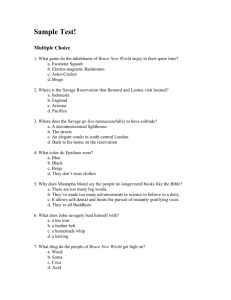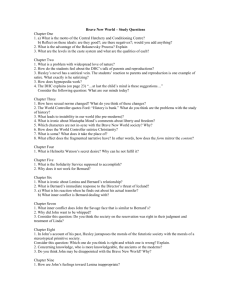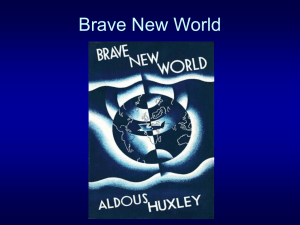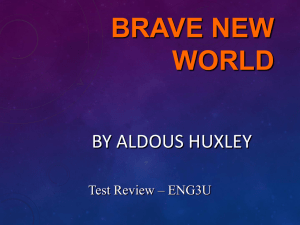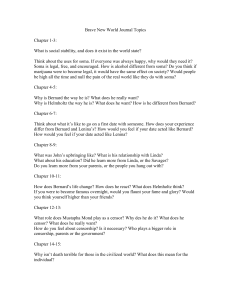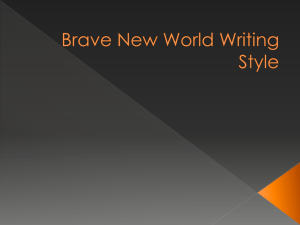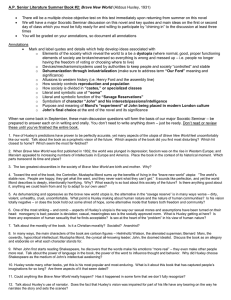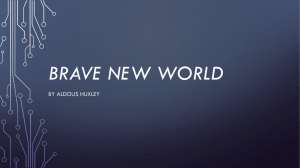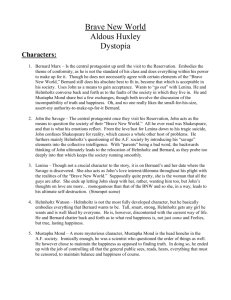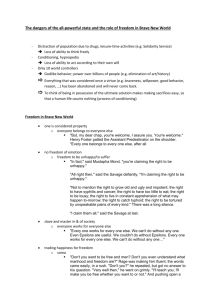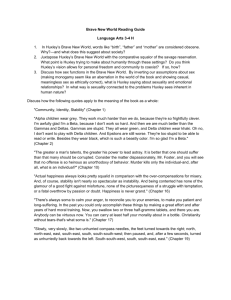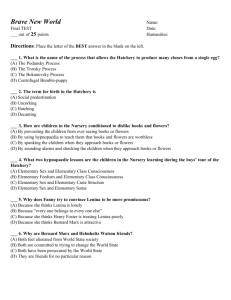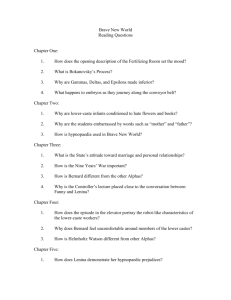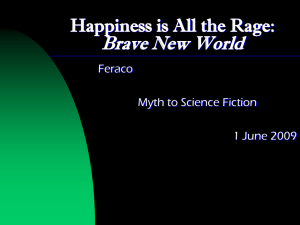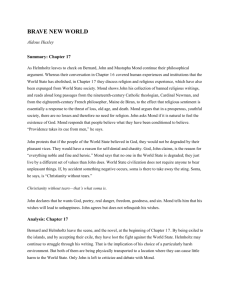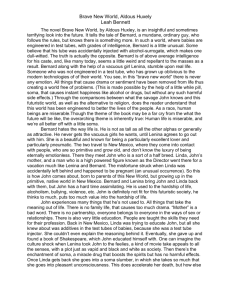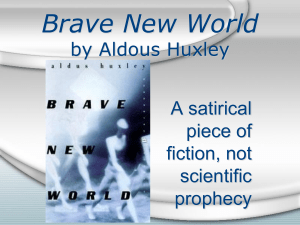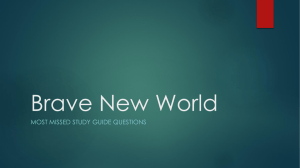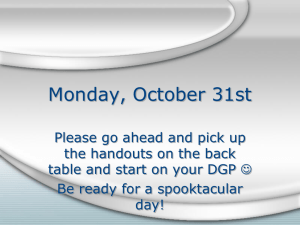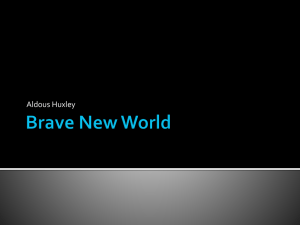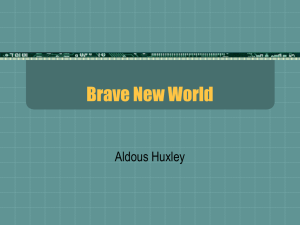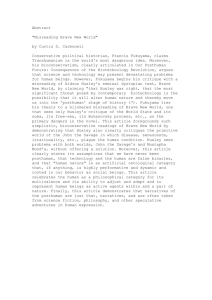socratic seminar questions: brave new world
advertisement
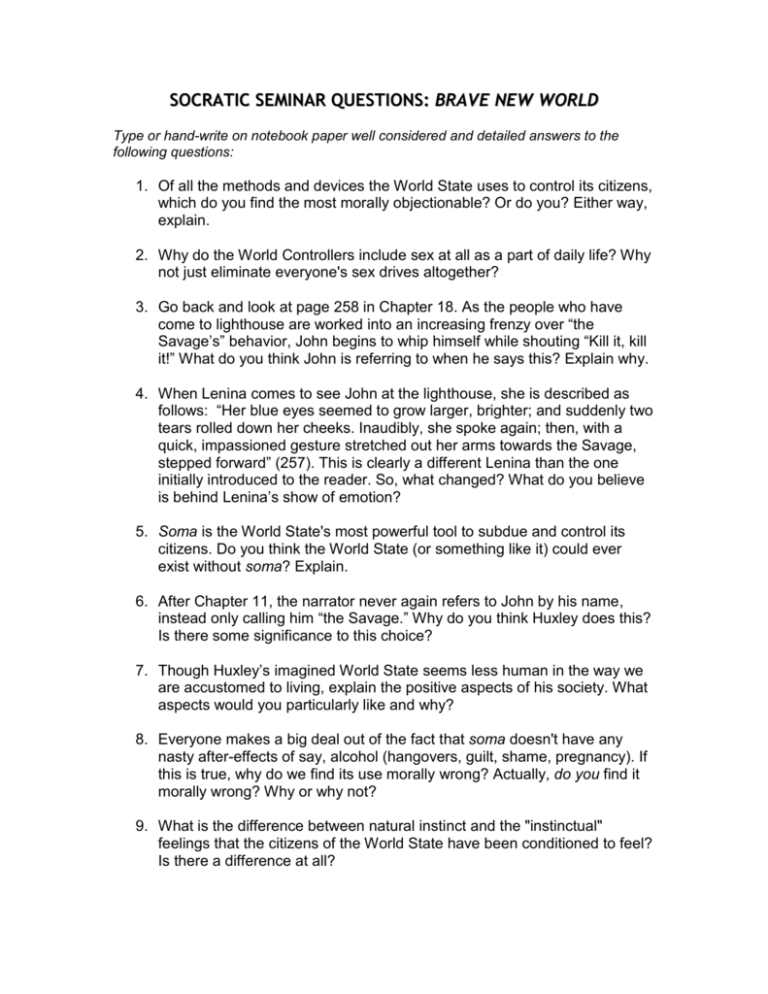
SOCRATIC SEMINAR QUESTIONS: BRAVE NEW WORLD Type or hand-write on notebook paper well considered and detailed answers to the following questions: 1. Of all the methods and devices the World State uses to control its citizens, which do you find the most morally objectionable? Or do you? Either way, explain. 2. Why do the World Controllers include sex at all as a part of daily life? Why not just eliminate everyone's sex drives altogether? 3. Go back and look at page 258 in Chapter 18. As the people who have come to lighthouse are worked into an increasing frenzy over “the Savage’s” behavior, John begins to whip himself while shouting “Kill it, kill it!” What do you think John is referring to when he says this? Explain why. 4. When Lenina comes to see John at the lighthouse, she is described as follows: “Her blue eyes seemed to grow larger, brighter; and suddenly two tears rolled down her cheeks. Inaudibly, she spoke again; then, with a quick, impassioned gesture stretched out her arms towards the Savage, stepped forward” (257). This is clearly a different Lenina than the one initially introduced to the reader. So, what changed? What do you believe is behind Lenina’s show of emotion? 5. Soma is the World State's most powerful tool to subdue and control its citizens. Do you think the World State (or something like it) could ever exist without soma? Explain. 6. After Chapter 11, the narrator never again refers to John by his name, instead only calling him “the Savage.” Why do you think Huxley does this? Is there some significance to this choice? 7. Though Huxley’s imagined World State seems less human in the way we are accustomed to living, explain the positive aspects of his society. What aspects would you particularly like and why? 8. Everyone makes a big deal out of the fact that soma doesn't have any nasty after-effects of say, alcohol (hangovers, guilt, shame, pregnancy). If this is true, why do we find its use morally wrong? Actually, do you find it morally wrong? Why or why not? 9. What is the difference between natural instinct and the "instinctual" feelings that the citizens of the World State have been conditioned to feel? Is there a difference at all? 10. Is Mustapha Mond right when he insists that a society of all Alphas would fail? What did you think of the "Cyprus experiment" discussed in Chapter 16? Why do you agree or disagree with Mond’s assertion? 11. Based on what we read, don’t Alphas seem to be the least satisfied of all the citizens in the World State? If Epsilons really are happy with their lives, then what's wrong (morally) with making them that way? Anything? Nothing? Why? 12. If you were forced to choose, which character in the novel would you be and why? 13. Different characters in the novel fight power in different ways. Bernard at first tries defiance; Helmholtz turns to subversive writing; and John leaves to live in solitude at the lighthouse. Are any of these effective? What do you believe would be the best way to fight the system in this novel? 14. Could anything like Brave New World really happen? Has it happened in some form that we don't fully recognize? Explain. 15. Does the novel have any loose ends it fails to tie up? If so, does that seem intentional by Huxley, and what effect does it have? 16. So, Mustapha Mond, Resident World Controller of Western Europe, is a pretty powerful guy in this book. Or is he? Who do you judge to be the most powerful character in Brave New World? Why? 17. Whether you agree with him or not, John possesses a pretty rigid system of morality (right and wrong). Do you think John learned morality from the Indians on the Reservation, from Linda, from Shakespeare, or from another source? Is John's system of morality religious in nature? 18. Is the ending to Brave New World at all optimistic? For any of the characters?
